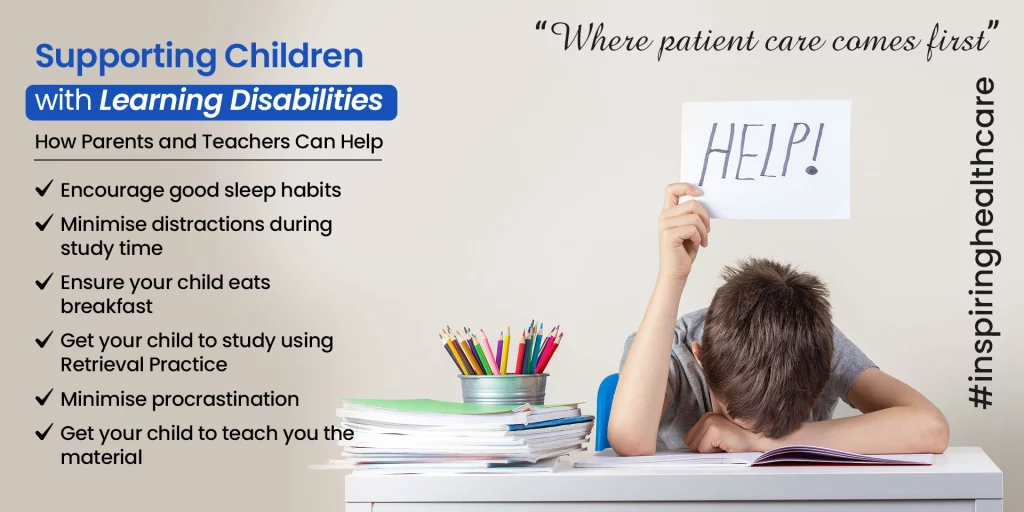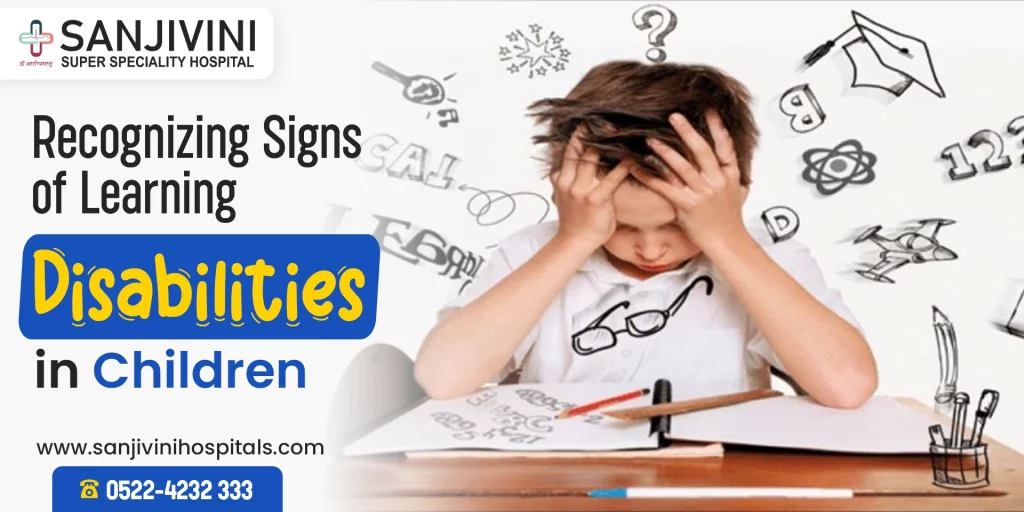Medically Reviewed by: Dr. Sonali Pandey– DCH, MBBS, DNB Paediatrics
Hey there, parents! Let’s talk about something really important: how kids learn. Sometimes, we notice that our little ones struggle in certain areas, and it can be confusing. That’s where this blog comes in! We’re here to help you understand signs of Learning Disabilities in Kids Think of us as your friendly guide, giving you the tools and know-how to support your child every step of the way. So, grab a cup of tea, sit back, and let’s dive into this together!
Understanding Learning Disabilities in Kids
Learning disabilities are conditions that start in childhood and continue into adulthood. They make learning certain things, like reading, writing, or math, hard. Common ones include dyslexia (trouble with reading and language), dyscalculia (trouble with math), dysgraphia (trouble with writing), ADHD (trouble with focus and organization), and nonverbal learning disorder (trouble with social skills).
Dyslexia affects reading and language skills, dyscalculia affects math skills, and dysgraphia affects writing and fine motor skills. These conditions can affect how well a child does in school and how they feel. It’s important to find and deal with learning disabilities early to help kids do better.
Also Read: Nutrition Tips for Picky Eaters: A Guide for Parents
What causes learning difficulties?
Learning disabilities in kids stem from differences in the brain’s processing of information, often present from birth. Various factors contribute to their development, including genetics, environmental influences like lead exposure, and prenatal issues such as maternal drug use.
Additionally, exposure to alcohol or drugs in the womb may heighten the risk. Poor nutrition and lead exposure post-birth can also play a role. Moreover, children with a parent having a learning disability face higher chances of having one themselves due to shared risk factors. In rare instances, injuries like dementia or traumatic brain injuries can lead to acquired learning disabilities later in life.
No matter the reason behind learning challenges, the initial step is acknowledging that your child is having difficulty and having a conversation with their teachers and doctor about your concerns. By working together, you can identify the factors contributing to the challenges and ensure your child receives the necessary support.
How do I know if my child has learning differences and difficulties?
If you suspect that your child has learning differences or difficulties, there are several signs to look out for:
Preschool-aged children might display:
- Language development delays. By 2½ years old, they should start using phrases or short sentences.
- Speech difficulties. By age 3, they should be understandable to adults.
- Challenges with learning colors, shapes, letters, and numbers.
- Difficulty rhyming words.
- Coordination issues. By 5 years old, they should be able to button clothing, use scissors, and perform basic tasks like copying shapes.
- Short attention spans. Between 3 to 5 years old, they should manage to sit still for a short story, gradually increasing their attention span as they grow.
- Frustration or anger during learning attempts.
For school-aged kids and teens, challenges may include:
- Difficulty following instructions.
- Poor organization skills at home and school.
- Trouble understanding verbal directions.
- Difficulty learning and retaining facts.
- Reading, spelling, or word pronunciation difficulties.
- Handwriting issues.
- Struggles with math calculations or word problems.
- Trouble focusing on and completing school assignments.
- Difficulty expressing ideas clearly through speech or writing.
Supporting Children with Learning Disabilities- How Parents Can Help
Creating a Supportive Environment at Home
Support children with learning differences by fostering social and emotional skills through love and support. Encourage participation in clubs and activities to build friendships and confidence. At home, focus on strengths, nurture early math skills, and maintain a nurturing atmosphere. Effective communication, balanced discipline, and independence are vital. Stay informed, advocate for them, and keep in touch with teachers for their success.
Advocating for Your Child’s Needs at School
Parents play a crucial role in advocating for their children’s needs in school, ensuring they receive the support and accommodations they require. Collaborating closely with teachers, therapists, and school staff helps create an inclusive learning environment. By staying informed about available programs and therapies, parents can actively seek out the resources their child needs to learn effectively.

Also Read: Caring for a Child with Asthma: Tips for Parents
Emphasize strengths
Every child excels in different areas. Identify your child’s strengths and encourage their development. Whether it’s math, music, sports, art, or caring for animals, praise your child when they succeed in these areas.
Explore & Utilize resources and support groups
You’re not alone on this journey. Seek resources and connect with support groups to learn more about parenting a child with learning difficulties. Sharing experiences and gaining insights from others can be invaluable.
Plan for the future
It’s natural to worry about your child’s future, but learning differently doesn’t determine intelligence. Help your child explore their strengths and interests when considering education and career paths. Many successful individuals with learning differences have thrived in their careers. Look into specialized career and work programs that teach essential skills and boost confidence. Additionally, numerous colleges offer support programs to help students with diverse learning styles earn their degrees successfully.
Are you concerned about your child’s learning difficulties? At Sanjivini Super Speciality Hospital Lucknow, we understand the importance of early intervention and support for children facing learning challenges.
📞 Call 0522 4232 333 or Visit https://sanjivinihospitals.com/ to book an appointment.

